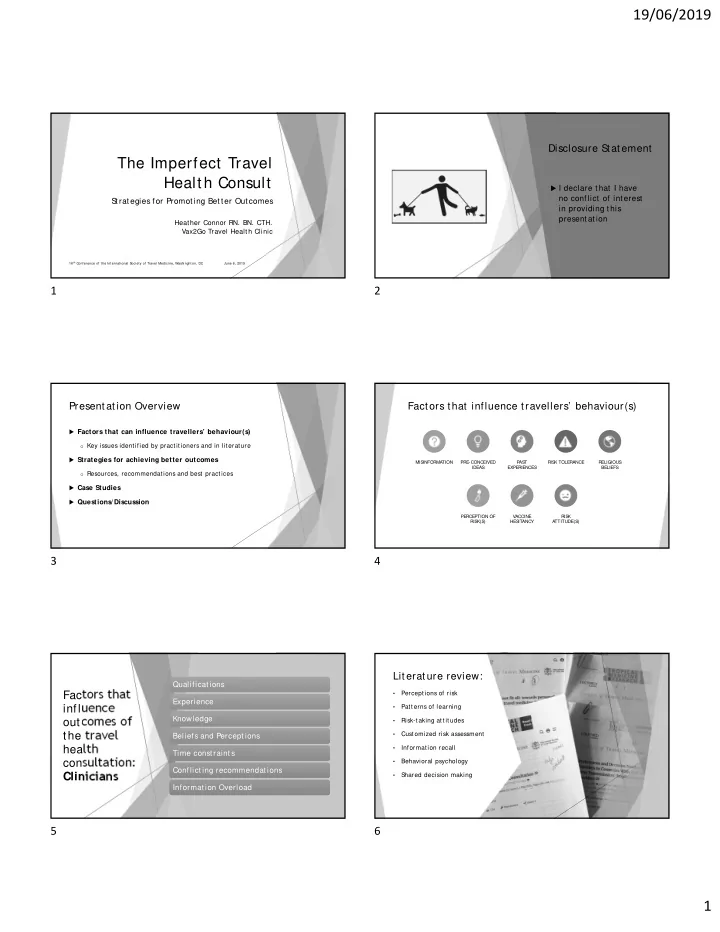

19/06/2019 Disclosure Statement The Imperfect Travel Health Consult I declare t hat I have no conflict of interest Strategies for Promoting Better Outcomes in providing this presentation Heather Connor RN. BN. CTH. Vax2Go Travel Health Clinic 16 t h Conference of t he Int ernat ional Societ y of Travel Medicine, Washinght on, DC June 6, 2019 1 2 Present at ion Overview Factors that influence travellers’ behaviour(s) Factors that can influence travellers’ behaviour(s) o Key issues identified by practitioners and in literature Strategies for achieving better outcomes MISINFORMATION PRE-CONCEIVED P AST RISK TOLERANCE RELIGIOUS IDEAS EXPERIENCES BELIEFS o Resources, recommendations and best practices Case Studies Questions/Discussion PERCEPTION OF VACCINE RISK RISK(S) HESITANCY ATTITUDE(S) 3 4 Literature review: Qualificat ions Qualificat ions Fact ors t hat Perceptions of risk • Experience Experience influence Patterns of learning • Knowledge Knowledge out comes of • Risk-taking attitudes the travel Cust omized risk assessment Beliefs and Perceptions Beliefs and Perceptions • health • Information recall Time const raint s Time const raint s consultation: Behavioral psychology • Conflict ing recommendat ions Conflict ing recommendat ions Clinicians • S hared decision making Information Overload Information Overload 5 6 1
19/06/2019 What can we learn from the literature? “ Pre-travel medical consultations often rely on blanket medical advice based on destination” Risk Perception: (Farnham et al., 2018) Perceptions of risk vary greatly among travellers “ Most travel health risks are These percept ions may not be realistic/ accurate not vaccine-preventable… but instead depend on modification Travellers’ perception of risk may not align with clinician’s of risk-taking behaviours based on an accurate risk estimation and the delivery of advice which effects positive (McIntosh, 2015; Bauer, 2005) behavioural change.” (Flaherty, 2018) 7 8 What can we learn from the literature? Methods of learning: People have different pat t erns of learning Learning st yles/ needs of younger t ravelers are oft en different than those of mature travelers Traveller’s previous knowledge and experience need t o be considered (Bauer, 2005) 9 10 What can we learn from the literature? What can we learn from the literature? Suggestions by Irmgard Bauer: Attitudes: A few simple questions added t o pre-consult at ion Travellers differ fundamentally in their attitudes (behaviour) to risks questionnaire (or asked verbally at start of consult) Risk-taking attitudes and risk perception are linked to health “ What are you most worried about for this trip? ” behaviour Did you get sick during or after a previous trip? Distinct risk profiles exist among different sub-groups of travellers What is your view on potential risk(s) for this trip? (Farnham et al., 2018) 11 12 2
19/06/2019 What can we learn from the literature? Attitudes Men, backpackers and young t ravellers have a higher willingness to take recreational risk(s) than women, luxury and older travellers Recommendat ion t o incorporat e a few short quest ions on t he pre-t ravel quest ionnaire, regarding t raveller risk attitudes Info from t hese quest ionnaires can ident ify high-risk characteristics of the traveller and enable clinicians to provide more specific advice (Farnham et al., 2018) 13 14 Main Take Away: One size does not fit all 15 16 Strategies for promoting better outcomes Clinicians must take a customized approach Understanding the risk perceptions, attitudes and learning needs of each t raveller is important Travellers should be free t o express concerns, ask questions and identify their priorities Clinicians and travellers work together to make decisions (shared decision making) 17 18 3
19/06/2019 What is shared decision making? Tips for shared decision making “ A process in which From the US Office of the National Coordinator for Health patients and clinicians Informat ion Technology: work together to make decision and select… Invite the patient to participate treatments… based on Present opt ions clinical evidence that Provide information on benefits and risks balances risk and expected outcomes with patient Assist patients in evaluating opt ions based on t heir goals preferences and values” and concerns (Nat ional Learning Facilitate deliberation and decision making Consortium, 2013) Assist patients to follow through on decision 19 20 Additional strategies for better Case Study: Co-decision making outcomes to avoid Zika Electronic, visual and/ or interactive aids Healt hy 28 y.o. male t raveling t o Caribbean Secure elect ronic messaging and apps Supplement ary informat ion for t ravelers (e.g., writ t en, One week st ay on a resort elect ronic) Use of plain language Height of Zika Use of large-size font t o emphasize key point s out break Use of icons and/ or colour codes 21 22 Heather Connor, RN BN CTH Vax2Go Travel Healt h Clinic Questions ? ? hcon5@ Hotmail.com 23 24 4
19/06/2019 Resources Resources The Pret ravel Healt h Consult at ion Immediat e Recall of Healt h Issues Discussed during t he Pre-Travel Consult at ion Iain B. McInt osh JTM Volume 22, Issue 3, 1 May 2015, p.143-144 Sarah L. McGuinness et al. Educat ional Issues & Concerns in Travel Healt h Advice: JTM Volume 22, Issue 3, 1 May 2015, p.145-151 Is all t he effort a wast e of t ime ? Preferences and Decision Needs of Bost on-Area Travellers t o Count ry wit h Risk of Irmgard Bauer JTM 2005; 12:45-52 Y ellow Fever Transmission: Implications for health care providers Does t he Dospert Scale predict risk t aking behaviour during t ravel ? Beth A. Lown MD et al. A st udy using smart phones JTM Volume 21, Issue 4, 1 July 2014 Andrea Farnham Ph.D. et al. JTM, Volume 25, Issue 1, 2018. Nat ional Learning Consort ium; Shared Decision Making; The Dospert Scale ( from Blais & Weber 2006 ) December 2013 Fact Sheet One size does not fit all: www.Healt hIT .Gov Towards personalized risk assessment in t ravel medicine. 2018. Gerald T . Flahert y MD JTM, Volume 25, Issue 1, 25 26 5
Recommend
More recommend